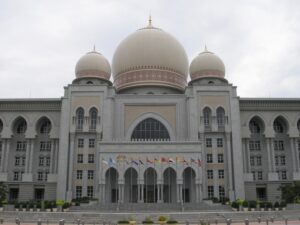During his Labour Day address, the prime minister announced that most economic sectors across the country may operate from 4 May onwards under a new Conditional Movement Control Order (CMCO), as long as the businesses adhere to the standard operating procedures (SOPs) set by the Ministry of Health.
By 3 May, nine states – Kedah, Sabah, Pahang, Penang, Kelantan, Sarawak, Selangor, Perak and Negri Sembilan – had announced their decisions not to fully comply with the CMCO. They refused to allow businesses to hastily open on 4 May, particularly after the long May Day weekend.
The public confusion deepened the next day when Azmin Ali, the senior minister in charge of the economic cluster, urged state governments to co-operate in executing the CMCO.
Controversially, he raised the threat of possible lawsuits from industry players if state governments were to continue going against the federal policy, which he said was implemented in accordance with the Prevention and Control of Infectious Diseases Act 1988.
What does this mean?
Under the Act (which is a federal law), the federal government, through the minister-in-charge, is allowed to make certain regulations. The latest regulation, which is the CMCO, allows certain sectors to operate.
At the same time, one must appreciate that the state governments still have power over matters related to public health and the prevention of diseases.
Under the Local Government Act 1976, the state governments, through the local councils, have certain powers to regulate and enforce quarantines as and when necessary. As an example, local councils had always taken the initiative to regulate and enforce laws to prevent the spread of dengue.
When it comes to business operations, the state governments, through the local councils, have the authority to issue business licences and permits, and in certain instances, to revoke them.
The debate now is whether there is a conflict between the federal and state governments in the implementation of the CMCO.
When there is a conflict between the federal and state governments, Article 81 of the Federal Constitution states that the federal government’s executive decision prevails.
However, the more important question which has to be asked is, were the state governments in actual fact going against the CMCO, or were the state governments merely trying to give effect to the CMCO by imposing additional safety and precautionary conditions?
In the case of the latter, as long as the actions taken do not go against the spirit of the CMCO, then they are valid.
Ideally, there should have been comprehensive discussions between the federal and state governments before the imposition of the CMCO as both sides should have a say when it comes to matters of public health and the prevention of diseases.
This could have prevented all the confusion among the public.
Additional information:
In an interview with Astro Awani’s Consider This on 5 May, Penang’s chief minister, Chow Kon Yeow, revealed details about the meeting which took place on 28 April between the federal and state governments. According to him, the federal government presented a “District Risk Reduction Programme” prepared by the Ministry of Health and indicated that SOPs to reopen the economy are being finalised. In response, the state governments asked for a week to make the necessary preparations. He argued that Penang is, in fact, abiding by the CMCO by taking steps to gradually open the economy, as opposed to using a “big bang” approach. See here and here for parts of the interview.



